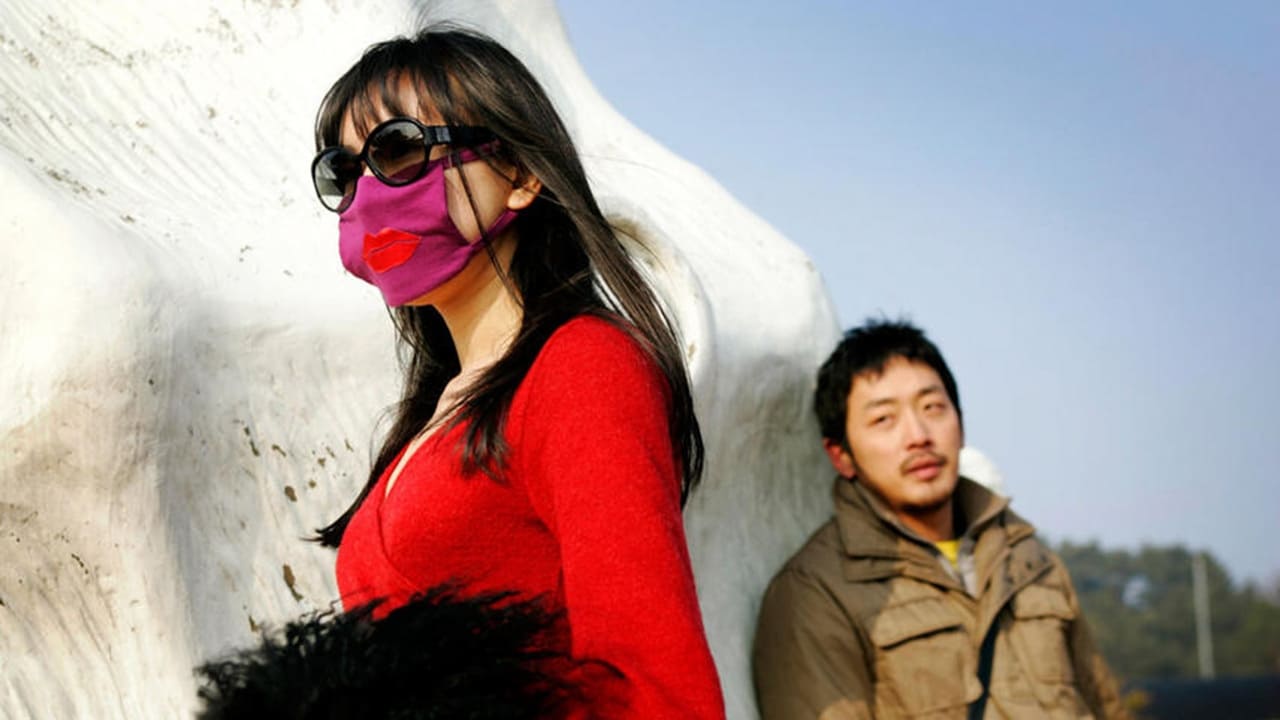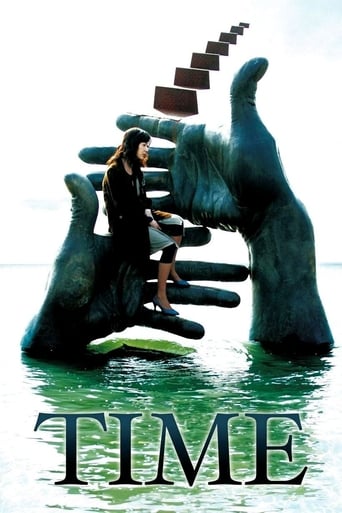AniInterview
Sorry, this movie sucks
SpuffyWeb
Sadly Over-hyped
SpecialsTarget
Disturbing yet enthralling
Ogosmith
Each character in this movie — down to the smallest one — is an individual rather than a type, prone to spontaneous changes of mood and sometimes amusing outbursts of pettiness or ill humor.
crossbow0106
This is a great idea for a film. Seh-hee (Ji-Yeon Park) thinks Ji-woo (Jung- woo Ha) is tired of her after two years of their relationship. She is insanely jealous, thinking he will go for anyone he comes into contact with. They break up and she gets plastic surgery, because she thinks Ji-woo is tired of her "same old face". In the interim, Ji-woo is very lonely, realizing he loves and misses her. She finds out he also gets plastic surgery and she tries to find him within the five moments their plastic surgeon said to wait until he will see her again. This film is filled with sometimes sad but great moments in which you truly understand the psychology of interpersonal relationships. The acting is uniformly good and the director, Ki-duk Kim, has put an almost fascinating spin on the travails of love, jealousy and anguish. Do you think Ji-woo and Seh-hee should be together again? As you watch, you wonder. I highly recommend this original film, which in terms of cinematography looks so vivid. Based on this film, I will be interested in the director's and the actors other works. That is a ringing endorsement for this film alone.
Film_critic_Lalit_Rao
Kim Ki Duk's film Shigan/Time is about the concept of beauty which differs from person to person.He has built his film around a couple of young,violent lovers whose whimsical behavior reveal hotheadedness prevailing in South Korean society.Much of the film tries to find out why people especially youngsters start to get bored in relationships ? Although Shigan/Time concentrates its energies by depicting various procedures used to beautify ordinary looking people,it loses no time to convey that real beauty lies in one's heart.We get a clear message that inner beauty is important than a person's external appearance.Kim Ki Duk also suggests that boredom is not entirely a curious phenomenon related to affluent nations as this malaise of western world has already started to rear its ugly head in new developed nations too such as South Korea.It is a pity that not much is known about Kim Di Duk's motivation for making such an inspirational film.However,one can hazard a fortuitous guess that Kim Di Duk made this film due to an old incident of his reckless wild life when he was rejected by some girl.
Cihan "Sean Victorydawn" Vercan (CihanVercan)
A poet said that there are 3 types of love: First for a REASON... You love someone for a reason(because she's beautiful,because she's special etc.) Second is to love AS... You love someone as good as she loves you,as much as you love your mum, etc. Third is to love DESPITE... Despite she's ugly, despite she's moody, despite she's lighthearted, etc. Then he added, to truly love someone is to accept her/his nature with pros and cons altogether.In Kim Ki-duk's "Shi gan(Time)" the whole plot is based on a Korean couple who are at their mid-20s. Even though, they're getting prepared to marry, they don't realize that their relation is still relying on reasons. Like every fresh couple, since they don't express their needs and wishes to each other, their harmony goes downhill by time. Seh-Hee surprisingly leaves her lover without any warning or explanation due to her jealousy on him. She decides to have a plastic surgery to get a more beautiful face than she has. That way, when she comes back, she'll feel more comfortable for securing her love through her beauty. In other words, she leaves him for the shortfall of trust in their relationship. Right here at the character intro scenes(the first half-an-hour) there's a drastic message: You love someone for a reason, you'll lose her/him for another.Kim Ki-duk has set his screenplay out for reflecting the social affinity of South Korean women to plastic surgery. Social statistics mark that South Korea is among the world's top 3 countries regarding this subject. Kim Ki-duk's cinema language carries a great focus on the main plot and he enriches this focus with use of Symbolism. Just like in a poet, each word and each act represents a deeper meaning more than itself. This creates a few memorable scenes: First in the public ferry-boat scene, second the scene with sculptures and figurines at the beach park, third the change of the tide on the beach when lovers are parted, finally before the closure most of the Seh-Hee's parts carry Symbolism in words: 1/"If we turn around and make eye contact, then we should meet again. One, two, three..."(means my eyes were at you when you were with other women, if you've ever been aware of that I'd never have left you) 2/"You should realize how happy you are, just do well on your part"(means you must be happy for being loved by me) 3/"Things happening suddenly, when something lost, it never comes back"(means love happens all of a sudden, when you're loved you're not aware of it; the moment you start to aware of someone's love, it vanishes away)Instead of trying to express the feelings with words, Kim Ki-duk hides the true meanings away; which may also mean that he kept a secret between him and his characters against us. It's truly to see how deep a love can get with keeping it as a secret. This concept was very rare to come across. On the other hand, even though the main plot is unique, its sub-plot(plastic surgery) is not.In cinema history, there are notable films within various genres featuring plastic surgery. Starting to count, let's look at the drama/romance genre first: In Elizabeth Taylor's popular drama movie "Ash Wednesday(1973)", Taylor's character tends to have plastic surgery for the same reason as Seh-Hee herein, to retain her lover's attention on her. From the recent years, Alejandro Amenabar's "Abre Los Ojos" and its Hollywood copycat "Vanilla Sky" tell the off-base story of a playboy's lose of his handsome face due to a traffic accident, and his captious dreams of regaining his face with plastic surgery. From the TV, 2005's Golden Globe winner TV-drama "Nip/Tuck" was taking its departure with two plastic surgeons of opposite personalities.Plastic surgery was also memorable in Robert Zemeckis's "Death Becomes Her(1992)" where Meryl Streep and Goldie Hawn were making up a fun out of this subject. Addictive to look younger, these aged ladies were competing with each other via having plastic surgeries until they explore a youth elixir. Another funny example of a plastic surgery comedy had been featuring in a scene in Terry Gilliam's "Brazil(1985)" where the leading character's mother wants to have plastic surgery without anaesthesia while she's wide-awake. Whereas in the horror genre, the plastic surgery has used very seriously. The cult filmmaker Jesus Franco's "Faceless(1987)" was a psychopathic crime story, in which a plastic surgeon kidnaps a beautiful model to stitch up her face into his sister's. Dated 1960 the British horror "Circus of Horrors" told another crime story of a plastic surgeon who takes his patients prisoner to work as models at a circus of horrors. Maybe the earliest example to a plastic surgery concept on the silverscreen was Humphrey Bogart's "Dark Passage(1947)". This was an unique crime/thriller movie, having Humphrey Bogart as a criminal's new face after the plastic surgery which made it easier for him to hide away from the police. In the other crime/thriller movies that used plastic surgery in its content, Michael Caine's "The Jigsaw Man" displayed a KGB agent who sent to Britain for misleading targets. John Travolta and Nicolas Cage's "Face Off" on the other hand, brought a fresh idea of shifting agents with each other by means of plastic surgery. Looking at a Turkish TV epic of crime genre "Kurtlar Vadisi" displayed a MIT spy becoming a Mafia boss after a successful plastic surgery altering into a new identity.For now, the last sample of this plot is Shi gan, which is among the top ten most important movies of the decade through its unique cinema language. Shi gan develops a story from separation of lovers and connects it with plastic surgery, then climbs up the relationship ladder to become a cure for parted couples. It's a must-see for everyone who is seeking a good drama to watch.
Roland E. Zwick
In combining elements of sci-fi and fantasy with a thoughtful, contemplative study of human relationships, the Korean film, "Time," brings the adage "Beauty is only skin deep" to a whole new level.When she begins to sense that her boyfriend, Ji-woo, may be losing interest in her, Seh-hee decides to undergo plastic surgery so radical that even he will not be able to recognize her. Her plan is to then insinuate herself back into Ji-woo's life under the guise of her new identity, hoping to stave off his growing indifference and, in so doing, give them what amounts to a second chance as a couple. Needless, to say, Seh-hee 's scheme does not work out quite as planned and she learns some pretty powerful lessons about the way true love actually works.Although Seh-hee clearly believes that by altering her appearance she will be able to change her inner makeup as well, the truth is that she remains every bit as grasping, jealous, melodramatic and paranoid after the surgery as she was before. No amount of change in her looks can raise her self-esteem or make her any less difficult to deal with. Her boyfriend, meanwhile, becomes a pawn in her twisted game, as he is tricked into inadvertently rekindling a romance with a woman who carries with her all the same baggage he had so much trouble putting up with in the previous relationship (despite the fact that he genuinely loves her).An attack on the looks-obsessed nature of modern culture, "Time" is not a "thriller" in the conventional sense of the term. It demands patience as it goes about the business of laying out its storyline and doesn't go in for a whole lot of fancy horror movie pyrotechnics to raise the audience's hackles. Instead, it relies mainly on subtle psychological insights to generate a feeling of imbalance and unease. Seh-hee is clearly mentally and emotionally unstable, and writer/director Ki-duk Kim's subtle, almost Pirandellian way of dealing with that madness makes it all the more disturbing. Strong performances, steady direction, sharp cinematography and an unnerving view of human nature all combine to make "Time" an offbeat, memorable experience. Don't expect to jump out of your seat or bury your face in your hands during the course of this film - for in the case of "Time," the chills all take place in the mind.

